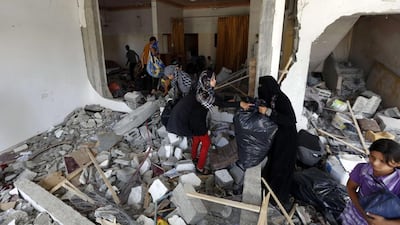The open-ended ceasefire between Israel and the Gaza resistance to end thefighting has dominated the Arabic-language press, with most comments hailing it as a victory for the Palestinian people beyond the conventional means of weighing gains and losses.
Abdel Bari Atwan, editor-in-chief of the London-based news website Rai Al Youm, wrote that the Palestinians fighters won the fighting because they had instilled panic in the hearts of six million Israelis. The Palestinians had displayed highly skilful fighting capabilities, much to the shock of the Israelis.
The writer said this victory was attained not only by the steadfastness of the Palestinians, but thanks to the negotiators who withstood all kinds of pressure and stuck to their demands to have the blockade lifted and the border crossings opened. Talks on a seaport and airport were postponed to the next round.
The writer claimed that Gaza, which once defeated Alexander the Great, had inflicted a humiliating defeat on the Israeli prime minister, Benjamin Netanyahu. None of the objectives set by out by Mr Netanyahu, including destroying and disarming the resistance, were achieved.
Writing for the Jordanian daily Addustoor, Areeb Al Rantawi said that under conventional equations of war, Israel’s losses represented only about three per cent of what the Palestinians in Gaza suffered. Counting the cost in a traditional way, 68 Israelis were killed and a few hundred were wounded, whereas on the Palestinian side, more than 2,000 Palestinians died and 10,000 others were injured.
Yet, it does not take much effort to establish who really won the battle, he added. Tens of thousands of Palestinians in Gaza, the West Bank and Jerusalem took to the streets to celebrate their victory; messages via mobile phones and social media all pointed to the winning party. On the other hand, Israel’s cabinet ministers were informed of the truce by phone, with silence reigning among the ruling class and speculation rising about the looming end of Mr Netanyahu’s political career.
Gazans displayed brave resistance and their victory against an army equipped with the most advanced weaponry was well deserved.
The writer said that Israel failed on many fronts in its latest attack on Gaza. It lost the sympathy of many of its allies and lost a great deal in the battles of “image and narrative”. It also failed to achieve any of the goals it set for the offensive.
Palestinians, on the other hand, emerged more unified and confident in themselves and in the resistance, as the Israeli occupiers succumbed to demands for the immediate reconstruction of Gaza and opening of the border crossings.
Israel’s third war on Gaza has pumped new life into Palestinians and should usher in a new period in the long and costly struggle for freedom, the writer said.
Striking a similar tone, Fahmi Huwaidi remarked in the Cairo-based newspaper Al Shorouk that after more than 50 days of fighting, joy has swept the streets of Gaza. Crowds were jubilant at news that their fighters had repelled the aggressors and shifted the fear into Israel, he wrote.
According to an opinion poll by Israel’s Channel 2, 80 per cent of Israelis were dissatisfied with Mr Netanyahu’s performance and 90 per cent said they did not approve of the Egyptian-brokered ceasefire.
Granted, the people of Gaza suffered a hellish situation at the hands of the occupiers and all of them paid dearly during the attack. Yet they retained their dignity and put their agonies aside when the ceasefire was declared and went out to celebrate the feat of standing up to arrogance and brutality, the writer concluded.
An editorial in the UAE-based Al Bayan said that the Palestinians had won the fight despite a huge disparity in the balance of power. After nearly two months of hostilities during which Israelis used their arsenal of weapons from air, land and sea, the Palestinian resistance remained cohesive and capable of striking back right up until the ceasefire.
The occupation forces failed on a domestic level because half the Israeli population had sought shelter and the economy was hit hard, despite Israel’s Iron Dome defence shield and image of military invincibility.
The war also sparked division and finger-pointing inside Israel on the political and military levels, amid signs of a government crisis that could topple Mr Netanyahu.
The assault on Gaza created a new reality that could soon translate into a strategic defeat for Israel, the editorial said.
Translated by Abdelhafid Ezzouitni
aezzouitni@thenational.ae

